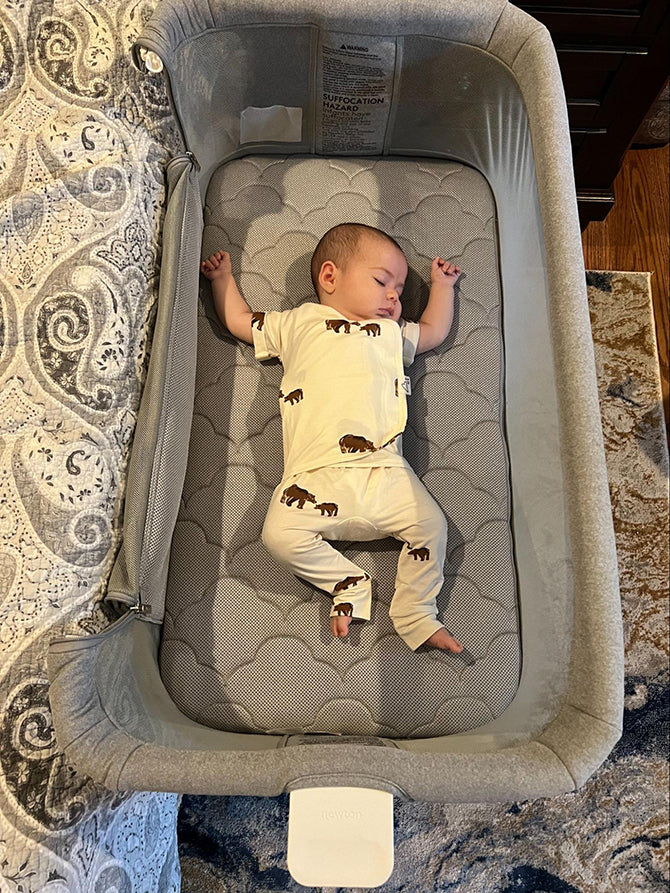Baby Growth Spurts: When They Happen and Signs to Watch For

Medically reviewed by Robyn Rosenblum, MD, FAAP

You’ve probably heard of baby growth spurts. It seems like overnight your little one shoots up and packs on the ounces and pounds. But when should growth spurts happen and what should you do about them?
This article will help you understand what’s really going on in your baby’s body during a growth spurt, how to anticipate these phases, and how best to deal with them.
Table of contents
- What are growth spurts?
- When to expect growth spurts
- 4 signs of an imminent growth spurt
- How to deal with baby growth spurts
- How long will growth spurts continue?
What are growth spurts?
Baby growth spurts are natural, concentrated periods of rapid growth when an infant gains weight and increases in length. But to do that, your little one will need to fuel that growth by eating more and giving their body downtime to focus on it.
Think of what your baby is accomplishing in a short period of time:
- Their muscles are taking shape and enlarging.
- Their bones are developing and lengthening.
- They’re laying down stores of fat that will help fuel more future rapid growth.
Growth spurts appear to depend on genetics. The same genes that dictate how tall your little one will eventually be also seem to trigger how quickly — and when — they will get there. Of course, it’s not their genes alone that control intense bursts of growth.
Diet, nutrition, general health, and exposure to or avoidance of toxins, such as lead, can affect a baby’s growth. So while growth spurts are normal and pretty much unavoidable, you can help your little one make the most of them and continue to develop in a healthy manner.
But when should you expect them?

When to expect growth spurts
Your baby’s unique. So your experience with growth spurts will also be unique. And it’s good to keep in mind that there’s a difference between growth spurts and developmental milestones, even if they are related.
For example, weight and length increases characterize growth spurts. They are signs of physical development, but they also lay a solid foundation for the motor and cognitive skills your baby will achieve.
Head growth is super fast in infancy as the brain grows rapidly. With that comes brain growth and cognitive advancement, as your baby learns to interpret the world and interact with it. Developmental milestones focus on your little one’s ability to think, move, and play.
So the two types of advancement — growth and skills — are related but don’t necessarily occur at the same time. That said, there are some general time periods where you can be on the lookout for a baby to experience a growth spurt.
Basically, expect a lot to happen in year one. It’s a busy time for your little one’s body. In the first six months of life, the average baby may grow one-half to one inch every month and gain five to seven ounces weekly according to the Mayo Clinic.
At that rate, by the end of the year, they’ll have grown almost a foot and will have tripled their birth weight!
When tracking your little one’s growth spurts, the first period to watch out for is the most obvious: the first seven to 10 days.
Your little one will be coming off the growth pause they hit as they entered the world and switched from steady placental nutrition to a new method of nourishing their body.
Babies normally lose weight in the first five days, then make up for it by putting weight on quickly in the next five or so.
Other periods to expect a growth spurt:
- 3 weeks
- 6 to 8 weeks
- 3 months
- 6 months
- 9 months
- 12 months
Keep in mind that these are approximate ranges that your baby may totally ignore. So don’t be upset if nothing immediately happens when your little one reaches these ages without suddenly sprouting up. Instead, be alert to signs that a growth spurt is imminent.
As for tracking growth spurts, talk to your pediatrician. They’ll make a chart of your little one’s height and weight during frequent wellness checkups and compare their measurements to the average growth of a baby their age using the World Health Organization chart.
This comparison lets you know how your little one is growing relative to their peers. If they’re lagging behind, your doctor will do additional tests to find out why and may have some tips to ensure they’re eating enough.

4 signs of an imminent growth spurt
Hunger
One sign of an imminent growth spurt is when your baby goes from having a modest appetite to being ravenous. Some babies seem to want to eat constantly.
If your baby is nursing, this increased feeding will stimulate more milk production. If your baby is older and taking solid foods, they may demand more of them, too.
When breastfeeding, some moms worry that they’re not producing enough milk to satiate their growing child. That’s usually not the case, but consider reaching out to a lactation consultant if you’re concerned.
Sleep issues
Though your baby’s body will generally need more sleep during a growth spurt, often sleep interruptions indicate your baby is in super growth mode. This may be due to increased appetite and wanting to feed in the middle of the night or during nap time instead of sleeping.
However, some babies seem to have received their body’s “need more sleep to grow bone and muscle” memo. So you may notice your little one taking longer naps or sleeping longer in the morning.
As always, keep in mind that each child is different, and whether it’s increased or decreased sleep, the root cause may be the same.
Fussiness
Expect your baby to have a lot more feelings during a growth spurt.
It might seem odd for an infant to be emotional, but your little one is experiencing some tough stuff for the first time: hunger, sleep interruptions, and perhaps even physical discomfort as their body quickly changes.
No wonder they might be grumpy!
This may also happen while they are eating. Nursing babies will often latch and unlatch, trying to get extra milk that may not be immediately available.
Teething
As your baby gets older, growth spurts may coincide with teething, generating another set of indicators or exaggerating existing ones. Teething symptoms can include irritability, slight fever, constant gnawing, and lots of drooling.
How to deal with baby growth spurts
If you notice a growth spurt coming on, there are a few ways to help your baby through it.
Feed your baby
It sounds obvious, but if your baby is extra hungry, feed them! Don’t worry at this stage about them taking in too much. They’re fueling a tremendous building project.
Try cluster feeding
If you’re breastfeeding, feed on demand. You may hear this described as cluster feeding, which is when your baby suddenly seeks many feedings over a short period of time, typically every 30 minutes to an hour. Your body will quickly adjust your milk supply to compensate.
Babies often cluster feed during the first growth spurt at about three to six weeks.
It’s no wonder these marathon-long feedings feel so challenging: In the first six months, the amount of breast milk your baby will drink doubles. That’s a lot of milk!
During these periods of non-stop nursing, remember that caring for your baby means taking good care of yourself, too. Here are a few tips to keep in mind:
- Stay hydrated
- Eat well, and keep healthy snacks nearby
- Try to stay as well-rested as possible
- Plan entertainment (like a favorite movie or show) around the feedings
- Feed your little one at different locations in the house
- Make it a family affair — get your partner to join you for company
- Stay the course — as we said, these feedings are amping up your milk supply to make future feedings easier
If you’re not breastfeeding but are using formula as the mainstay, offer your baby a little extra if they seem hungry.
Increase daytime feedings
Of course, the nights are the hardest time to manage your little one’s hunger during their growth spurts. One strategy to get more zzzs is to step it up during the daytime. The more your little one consumes during the day, the easier the evening may be for you.
Add a dream feed
Dream feeding, or feeding the baby right before you go to sleep (usually between 10 p.m. and 12 p.m., while they’re already sleeping), is yet another good strategy for both breast and formula-fed babies, as with this extra late-night feed, they tend to sleep longer through the night.
This might all seem overwhelming, but take heed: The good news is that this insatiable appetite stage usually only lasts a few days.
Help them sleep

Sleep can be a challenge. As we mentioned, during a growth spurt, your little one will need more of it, but they’ll also be less likely to sleep well. Here are some ways to make sure you’re all getting the most out of naps and nights.
Keep up your bedtime routine
Once it’s time to put your baby down for a nap or for the night, it should feel like Groundhog Day. That is to say, try to keep good nighttime and nap rituals. You should be going through the same steps before bed every time so your baby can start to anticipate sleep.
When it comes to a routine, keep things calm. In addition to a feeding session and a diaper change, you may try a baby massage, some soothing music, and a bedtime story before wrapping them in their swaddle and placing them on their back in their safe sleep space.
Create a proper sleep environment

There are many ways to improve your baby’s sleep environment so they can have a more restful night. Before we get into that, though, a word about where they should be sleeping these first months.
The American Academy of Pediatrics states that for the first six months, your baby should share a room with you, as room-sharing (not bed-sharing) can decrease the risk of SIDS by 50%.
The best way to achieve this is with a bassinet next to your bed.
The Newton Baby Bassinet is 100% washable as well as breathable due to our patented Wovenaire® technology. It also features an infant-access opening, so that you can quickly get to your baby to soothe them.
Now that we’ve established that your little one’s snoozing in your room, it’s time to optimize the space for everyone’s sleep. That means making sure the room is quiet, dark, and not too hot or cold.
If it’s hard to block out some of the outside noise, you may want to try a white noise machine.To keep light from streaming in for daytime naps, consider blackout shades. And, as for temperature, be sure to set the thermostat between 68 and 72 degrees Fahrenheit.
Ensure baby’s safety
When we talk about a proper sleep environment, we should also mention safety. Be sure to place your baby in a crib, travel crib (also called a pack-and-play), or bassinet intended for overnight sleep. Never place them in a swing or bouncer, sofa, or adult bed.
When you put them down, place them on their back, as this is the safest way for them to sleep. You’ll also want to make sure their crib is clear of any blankets, toys, bumpers, pillows, or other soft items. In fact, there should not be a blanket in their crib for at least the first year.
Dress them for the temperature
As we said, your baby’s room should be “just right” (not too hot or too cold). Also you’ll want to avoid dressing them in too many layers since babies can easily overheat.
Consider a breathable mattress
Whether your baby is sleeping in a bassinet or a crib, you’ll want to make sure you get a breathable, washable mattress, like the Newton Wovenaire Bassinet Mattress, included with the purchase of the bassinet, or the Newton Baby Crib Mattress.
Another option is our Essential Crib Mattress, which is two-stage, with one firmer side for newborns and a cushier side for toddlers. It not only features the Wovenaire® core but is also GREENGUARD Gold Certified.
No matter which mattress you choose, don’t forget to pair it with our Breathable Organic Cotton Sheets.

You can even think ahead and make plans for where their growth will take them by considering convertible cribs that can keep them sleeping soundly as their body stretches and outgrows a crib.
Wrap them In a swaddle

In order to promote better sleep, you might want to try using a swaddle blanket. By wrapping your baby up in a swaddle (almost like a burrito), you’re able to calm their Moro reflex — also called their startle reflex — so they do not wake themselves up unnecessarily.
A swaddle replicates the cozy feeling of the womb and promotes restful sleep. However, they can only be used for the first few months — basically, until your little one starts trying to roll over, which is often at about two to four months.
At that point, trade their swaddle for a sleep sack, which is a wearable blanket that will keep them cozy and safe through the night. Little ones can use a sleep sack up until two years old, although if they’re very active, you might switch to PJs a bit sooner.
Try a pacifier
Although you don’t want to force it, there’s evidence that a pacifier can help babies sleep better. A pacifier can soothe teething pain so their discomfort doesn’t awaken them. Insert the pacifier while your baby is drowsy, especially if they’re starting to fuss from being put down.
One trick is to then put a hand on them so as they start to suck the pacifier, they know you’re right there.
When choosing a pacifier, be sure to get the right size and ensure the one you choose is only one piece so it can’t come apart and become a choking hazard.
Put them to bed drowsy but awake
Another strategy to help your baby get as much sleep as possible during a growth spurt is putting them in their crib or bassinet drowsy but awake. This is especially important if you have a little one who prefers sleeping in your arms (and then wakes up when you put them down).
If they’re drowsy when they’re put in their crib, they’re going to get used to self-soothing and sleeping on their own.
Try a bath before bed
Giving your baby a bath before bed can make them feel extra sleepy. This is because after coming out of the bath, their body temperature will cool, which has been proven to help them fall asleep more easily.
Note, however, that you don’t want to do daily baths, as too much bating can dry out their skin. Stick with about three baths a week unless more are needed.
Resist the urge to run to them when they cry
Your baby is smart. If you’re running to their side every time they make a peep, it’s not only going to make you exhausted, but it also doesn’t really help them. Better that they learn to self-soothe.
When you hear them stir, wait a couple of minutes to see if they can settle on their own before opening that door.
Patiently ride the emotional rollercoaster
Once you have a context for understanding your baby’s sudden personality change, you can focus on how to help them through it. They have no idea what they’re going through or why, so your reassurance can really help.

Soothe and cuddle them
Set aside extra time to soothe and cuddle your baby. Singing, rocking, rhythmic back pats, outdoor excursions — experiment to find which best helps your little one settle down and make it through their body’s sudden development sprints.
Hold them close
A lot of times simply feeling close to you is going to help. Hold them close to your chest and take some calming breaths. When they feel that you’re calm, they’ll be more likely to calm down themselves.

How long do growth spurts last?
Each growth spurt your baby experiences won’t last that long — usually a period of days to a week. But the phenomena of growth spurts will be with you for a while.
Keep in mind your baby will have completed a ton of growth in year one, so they won’t grow as fast or enter as many growth spurts in as short a period of time after those first 12 months. By the time they are two years old, most children are joining the slow and steady school of growth.
They do still have episodes where growth is more rapid. These may last for a few weeks or even months. Strangely enough, these spurts often happen more in the spring than at other times of the year.
This continues until the big one hits — puberty. Between eight and 13 in girls and 10 and 15 in boys, the mega growth spurt adds weight, height, and body transformation to the mix. But that’s a long way off for your little one!
Making your baby’s growth spurts count

Growth spurts are a totally normal and healthy part of your little one’s development. So, be prepared to recognize the signals — increased hunger, fussiness, disrupted sleep, etc. — to help your baby navigate these challenging periods.
As they are experiencing a growth spurt, give them ample food, keep up their sleep routine, and patiently soothe them as they go through the ups and downs of growing.
To make the most of feedings, you’ll have to take care of yourself too — that means nutritious food and as much rest as possible.
When it comes to bedtime, providing your baby with a solid foundation for sleep, like Newton Baby mattresses and beds, will be a big help. With better rest, they’ll get through the few days of discomfort and be back to their normal selves in no time.
With a bit of extra love and care, your little one will be not-so-little before you know it!